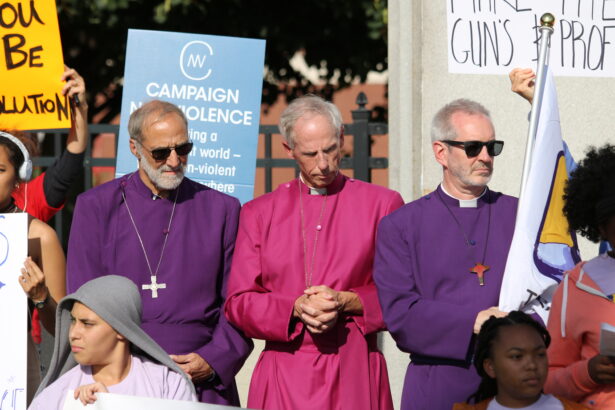By Arnie Alpert
Despite failing to pass a human rights resolution, one group of investors will continue the fight to hold the world’s biggest firearms manufacturer accountable.
The killing of seven people and wounding of 47 more in Highland Park Illinois on July 4 was committed with a weapon made by Smith & Wesson, the world’s biggest firearms manufacturer. So was the killing of 17 people at Marjory Stoneham Douglas High School in Parkland, Florida in 2018.
Perhaps it’s no surprise that guns made by Smith & Wesson would be implicated in gun crimes, a category that reached record heights in the United States last year. Neither is it a surprise that the issue crosses U.S. borders.
In a lawsuit targeting major gun manufacturers, the Mexican government cited numerous examples of Smith & Wesson rifles being smuggled over the border to criminal cartels. The company is well aware, the lawsuit says, “that its marketing would motivate and attract criminal users — including the cartels — to select and misuse its products in unlawful acts of violence.”
For some of the company’s stockholders, the use of its products to commit murder demands change at the highest level of corporate governance. They are calling on the company to adopt a human rights policy consistent with the United Nations Guiding Principles on Human Rights. The company’s management rejects the idea as one that would harm its business.
Smith & Wesson, established in Springfield, Massachusetts 170 years ago, is one of only two major gunmakers whose stock is publicly traded. That makes the company, along with Sturm Ruger, accountable to the Securities and Exchange Commission. SEC rules enable shareholders to submit resolutions for consideration at the company’s Annual Meeting of Stockholders, where elections are based on the one-share one-vote principle.
The two sides faced off via video conferencing at Smith & Wesson’s annual meeting on Sept. 12. As similar proposals had fared in previous years, votes representing the majority of shares sided with the management. The result was a marked contrast with the outcome of Sturm Ruger’s annual meeting three months ago, when two-thirds of shares voted to require the company to assess the human rights impact of the firearms it makes and sells.

It’s fair to say the human rights stockholders are not your typical investors. Their Smith & Wesson resolution was filed by 15 groups of religious investors, mostly orders of Catholic nuns plus a couple of Catholic health care providers and the Episcopal Church. Judy Byron, a member of the Adrian Dominican Sisters and director of the Northwest Coalition for Responsible Investment in Seattle, is the group’s main spokesperson. Both groups work with the Interfaith Center on Corporate Responsibility, or ICCR, a 51-year-old organization that backed 504 shareholder resolutions in 2022.
Recalling her years as a schoolteacher, Byron said she remembers plenty of fire drills and earthquake drills, but added, “I never had to worry about someone coming into the school with a gun.”
Not just moral theater
With gun violence on the rise several years ago, Byron made what might be a counter-intuitive proposal: Her order should buy stock in gun-makers and gun-dealers. They had experience with shareholder activism going back to the anti-apartheid movement in the 1970s. It was time, she suggested, to apply what they had learned to the epidemic of gun violence. Soon, the Adrian Sisters had ownership shares in Smith & Wesson, Strum Ruger and Dick’s Sports. Then, along with other ICCR members, they started introducing shareholder resolutions. This year’s was their fifth resolution put before Smith & Wesson shareholders.
Dov Baum, who leads the American Friends Service Committee’s Economic Activism project, says shareholder resolutions are not just moral theater. “The resolutions are used as a way to get some public attention, a way to get your message across to the board and main shareholders that will see the resolution on the proxy [or the official notice of the corporation’s annual meeting].”
Assuming the resolution conforms to SEC guidelines, management has to respond in public. “Companies usually don’t like having these issues on their proxies,” Baum said. “So, in order to get them off the proxies, they oftentimes negotiate with the filer on removing the proxy in return for engagement. Usually they offer you a meeting.”
That’s precisely what happened in 2021, when AFSC and allies filed a shareholder proposal to Microsoft asking for an independent, third-party report on the company’s human rights compliance. After negotiations, the tech giant agreed to conduct and disclose an independent human rights impact assessment, including a review of its surveillance and law enforcement contracts.
Another example came in 2018, when — after meetings with religious investors — Dick’s Sporting Goods announced it would stop selling assault rifles.
The process is cumbersome. SEC rules restrict what can be proposed and by whom. Stockholders need thousands of dollars of company stock to propose a resolution, and they need to top a threshold of votes to reintroduce the same proposal in later years. Resolutions can’t be about ordinary business matters, but instead must deal with higher level corporate governance, such as adherence to human rights standards. One such set of standards, the United Nations Guiding Principles on Human Rights, has met SEC approval for inclusion in resolutions.
The U.N. Guiding Principles, which are widely accepted in the international community, state that all business enterprises have a responsibility to avoid contributing to violations of human rights. Moreover, they must try to reduce or mitigate human rights violations associated with their products, even when they were not directly responsible.
While Byron and her group were invited to a couple cordial meetings with Smith & Wesson’s corporate secretary, the conversations ultimately yielded no progress toward policies that might reduce instances of violence committed with the company’s products. So, they went ahead with their latest proposal, a resolution that called on the company’s board of directors to “adopt a comprehensive policy articulating its commitment to respect human rights.” After referencing the U.N. Guiding Principles, the resolution argued that “the risk of adverse human rights impacts is especially elevated for all gun manufacturers” and that a public policy articulating the company’s commitment to upholding human rights “would assure shareholders that these risks are being adequately managed.”
‘A well-funded and organized campaign’
Wanting nothing to do with this approach to running their business, Smith & Wesson’s management responded to the dissident shareholders in the proxy statement, describing them as minor investors who were only “minimally qualified” to even propose a resolution. Going further, management explained that — were they to follow the recommendations — the company could be forced to pay hundreds of billions of dollars a year to remedy harms identified by third parties who have no financial stake in the company.
“For the past five years,” management argued, “we have explained that the proponent is part of a well-funded and well-organized campaign that aims to damage our business.” Citing a statement issued by the Adrian Sisters after the Uvalde shooting calling for a ban on “militarized assault weapons with high-capacity ammunition magazines,” Smith & Wesson management made it clear they reject proposals from groups that aim to restrict sale of “some of our most popular products.”
The company was even more defensive with the House Oversight and Reform Committee, when CEO Mark Smith was invited to a hearing on July 27. Unlike officials from Sturm Ruger and Daniel Defense — which sold the weapon used at Uvalde — Smith stayed away. When Committee Chair Caroline Mahoney sent Smith a subpoena on Aug. 2 asking for data on Smith & Wesson’s sales of assault weapons, he responded with a defiant press release alleging an “unprecedented and unjustified attack on the firearm industry.”
“To be clear,” he said, “a Smith & Wesson firearm has never broken into a home; a Smith & Wesson firearm has never assaulted a woman out for a late-night run in the city; a Smith & Wesson firearm has never carjacked an unsuspecting driver stopped at a traffic light. Instead, Smith & Wesson provides these citizens with the means to protect themselves and their families.”
On Sept. 12, Judy Byron was given a few minutes to address other shareholders directly at the annual meeting. After noting that gun violence had become the leading cause of death for children in the United States and highlighting the company’s absence from the House Oversight Committee, she said “We believe that these developments reinforce the seriousness of the risks created by Smith & Wesson’s failure to systematically assess or even track the adverse impacts of its products. A human rights policy would demonstrate to stakeholders that Smith & Wesson is not callous to harm resulting from the misuse of its products and to legislators that it is willing to collaborate in the development of solutions to mitigate those harms.”
Next steps
Despite this loss, Judy Byron takes the long view. After all, the Adrian Sisters campaigned against apartheid for 20 years before the South African regime fell — and that struggle involved more than shareholder activism. It took all kinds of resistance.
A glimpse of what that looks like for the gun violence prevention movement can be found just a few miles down the road from Smith & Wesson’s headquarters and principal factory, where the Rt. Rev. Douglas Fisher, Bishop of the Episcopal Diocese of Western Massachusetts, is already thinking about next steps.
Fisher chairs Social Responsible Investing for the Episcopal Church at the national level. In 2018, he sponsored a resolution to take firearms companies off the church’s “no buy” list in order to engage them more directly in dialogue. They’ve made little progress with Smith & Wesson so far, despite the resolutions.
“It’s long work, it’s really long work,” he said.

The Episcopal Church has also supported demonstrations by youth outside Smith & Wesson and backed legislative reforms. On Nov. 12, they’ll be at a farm in the Berkshires melting down guns and turning them into garden tools.
Meanwhile, just days before the Smith & Wesson meeting, the International Standards Organization announced it would establish codes for credit card companies to track weapons sales, an objective sought for years by religious investors and the Amalgamated Bank. Visa and MasterCard, both on the Northwest Coalition’s target list for facilitating sales of “ghost guns,” quickly announced they would begin using the new codes.
The day after the annual stockholders’ meeting, Byron said, “each time we raise these issues with the firearm manufacturers, people know about it, and people begin to think.” Smith & Wesson hasn’t seen the last of shareholders who want to see some gun sense from the world’s biggest firearms manufacturer. “We’re just going to keep these assets until they take responsibility,” Byron said.
Arnie Alpert is a longtime nonviolent action trainer in New Hampshire. He blogs at inzanetimes.wordpress.com.
This article was published on September 16, 2022, at WagingNonviolence.
